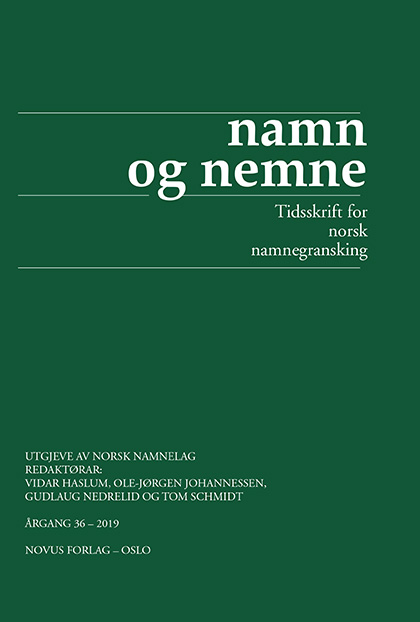Sammendrag
The etymology of the Old Norse noun mór m. 'sandy plain etc.' has not as yet been satisfactorily clarified. This is primarily due to its formally ambiguous structure, so that the correct Proto Scandinavian form has so far remained unknown to us. This noun is, however, well attested in farm names in both Norway and Sweden in forms like Mo or Moen, and two old Norwegian farm names Mo, which to-day are reflected in the modern town names Mo i Rana and Mosjøen, were borrowed from Proto-Scandi navian into South-Saami some time between 500 and 650. Consequently, Mo i Rana bears the South-Saami name Måehvie, which in all probability represents a (late) PrScand. acc. pl. *mÅhwã or *mohwã. The preferable form *mÅhwã is also ambiguous, but taken to re-flect a somewhat older form *mÅ«hwã (with *Å« > *Å before *h), it may be interpreted as etymologically related to e.g. ON múgi m. 'heap of hey, crowd of people' and Old English mÅ«ha, mÅ«ga and mÅ«wa m. 'heap of corn, mow'. Consequently, the Proto-Germanic forms seem to have been 1) *mÅ«Ìhwa(n)- (with stressed root syllable) in ON mór and OE mÅ«ha; and 2) *mÅ«gwá(n)- (with stressed suffix) in ON múgi and OE mÅ«ga, mÅ«wa. The original meaning was '(large) heap of different masses, e.g. sand, hey, corn, dung etc.' → 'sandy plain' in ON mór. The reconstructed proto-forms can, however, not be analyzed any further. The Norwegian farm name Frøland/Frøyland occurs in many parts of the country. It is obviously a compound, which in Old Norse is frequently attested in dat. pl. FreylÇ«ndum. The second ele-ment is ON land n. 'land, landed property, territory', probably ori-ginally in the plural, i.e. lÇ«nd n. pl. or landar, landir f. pl. The first Namn og nemne 2019 5.qxp_Layout 1 12.12.2019 12:29 Side 31 element ON Frøy was interpreted by Oluf Rygh as being the god name ON Freyr m. or possibly the goddess name ON Freyja f. Adolf Noreen, unwilling to accept this interpretation, assumed that Frøy-instead belonged to an unattested Old Norse adjective *freyr 'fertile', the only attestation of which was claimed to be the rare Norwegian dialect form frøy 'fertile'. This view was also shared by e.g. Magnus Olsen. It is shown, however, in this article that these names can only be seen as having the god name Freyr or perhaps the goddess name Freyja as their first element. The as-sumed adjective ON *freyr 'fertile' is shown to be an unacceptable form, and the dialect form frøy is most probably a relatively young variant of ON frjór 'fertile'.

Dette verket er lisensiert under Creative Commons Attribution-ShareAlike 4.0 International License.
Opphavsrett 2019 Harald Bjorvand

